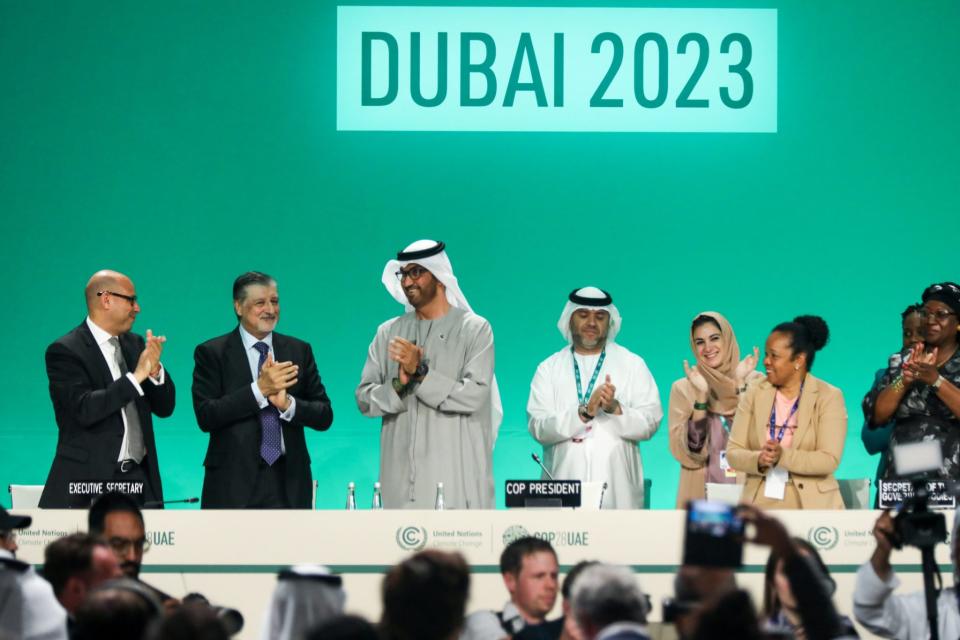At COP28, leaders found consensus on reducing Scope 3 emissions

Was the most important outcome from COP28 left out of the final resolution? According to Emmanuel Faber, chair of the International Sustainability Standards Board, the answer is yes.
But let’s not get ahead of ourselves. The headline news this week was that a “UAE consensus”—per COP28 chair Sultan Al Jaber—was reached in Dubai. The resolution called for countries to “transition away from fossil fuels” by 2050, triple renewable energy by 2030 (and double energy efficiency), and invest in technologies like “carbon capture and storage” to abate CO2 emissions. Countries were also asked to reduce their coal use faster than previously planned.
Almost as interesting as what was in the deal, however, was what wasn’t. “Oil and gas” were barely mentioned by name—they went by the more generic “fossil fuels.” There was no mention of a “phaseout” of said fuels either—instead the world would “transition away” from them. And in a nod to countries demanding a clearer stance compared to a first draft, the text “called upon” its members to subscribe to the above ambitions, rather than to say they “could” consider them as options.
For most business leaders I met in Dubai, the consensus was a good enough outcome for a meeting led by an oil executive—Al Jaber—but not good enough to reach the net-zero destination. They called it a “pivotal moment,” a “milestone,” an “achievement,” and even a “historic step” (see also today’s CEO Daily). But they equally said that what mattered now was “action” and “hard work,” and that there could be no “backsliding” in any future meeting, starting with next year’s COP29 in oil- and gas-rich Azerbaijan.
But perhaps the most interesting take in the business world was that of ISSB board chair Faber, who is also the former CEO of Danone. In a call hours before the final agreement was reached, he told me the most important outcome of the meeting, not captured in the resolution at all, was the consensus he witnessed in his meetings on the need to measure, disclose, and reduce companies' Scope 3 emissions.
In the U.S., discussions over whether companies should be disclosing their indirect emissions have been delaying the proposed Securities and Exchange Commission climate disclosures rule for two years now. The latest rumor, Faber told me, is that the agency may finally come out with its rule next spring. But in Dubai, he said, the matter was closed. “I was really getting the feeling that the topic of accountability was there,” he said.
But it's accountability we need, he says. “We continue to hear from investors that this is what they need—Scope 3—because of the underlying risks, especially transition risks,” Faber said. “Eighty percent of transition risks are in Scope 3. So not having Scope 3 is like talking about a fifth of the problem—or the opportunity.”
Companies in Dubai, he felt, were on the same page, so the question is not whether, but how. “What we are unpacking is the level of guidance," he said. “We suggest safe harbor statements to regulators while companies get there, while still using the language because the sooner we all speak the language, the sooner we will use it.”
One of the attributes of the UAE consensus was that it used language clear enough to show the directionality of the energy transition, but vague enough for oil-producing nations and companies. Sure, when it comes to fossil fuels, the term “phase out” wasn't used. But no one should misunderstand the meaning of the alternative phrasing that the world needs to “transition away” from fossil fuels.
This kind of language will bring “clarity to the market,” Faber told me. And that, in turn, will help bring about a shift in capital allocation, and thus, the transition away from—or phaseout of—fossil fuels.
More news below.
Peter Vanham
Executive Editor, Fortune
peter.vanham@fortune.com
This edition of Impact Report was edited by Holly Ojalvo.
This story was originally featured on Fortune.com

 Yahoo Finance
Yahoo Finance 